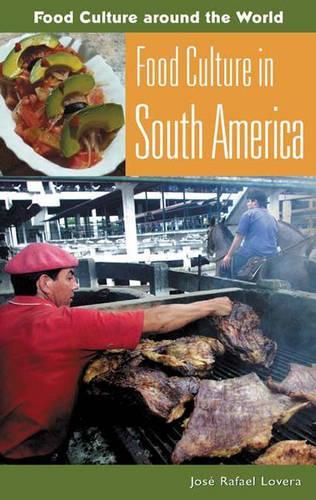
Food Culture in South America
(Hardback)
Publishing Details
Food Culture in South America
By (Author) Jos Rafael Lovera
Bloomsbury Publishing PLC
Greenwood Press
30th May 2005
United States
Classifications
General
Non Fiction
Sociology
Cultural studies: customs and traditions
National and regional cuisine / Cuisine of specific cultures or peoples
394.1098
Physical Properties
Hardback
206
Width 152mm, Height 229mm
482g
Description
Tells the story of the South Americans and their history through a survey of their food culture This volume tells the story of the people of South America and their history through a survey of their food culture. The cuisines of the various countries differ because of cultural heritage, cooking techniques and geography, and here they are divided into four zones. The traditions of the primary groups - Indians, Europeans, and Africans - and their five centuries of mixing have resulted in a stable food culture. The foods of the Indians before European contact still play an important role, along with other foods brought by successive immigrant groups. Europeans tried to establish their staples, wheat and wine, with little success. Many dishes, cooking methods, and food habits have survived with little modification since time immemorial. Students and other readers will learn much about South American food culture in daily life today, with special attention paid to historical perspective and rural and urban differences. The role of women in food preparation is discussed, along with the male cult of the meat roast (asado) among llaneros and gauchos (cowboys). The rise of the cooking profession is discussed, as well as the impact of the European conquerors on eating habits, the role of religious festivals and special occasions, and the effect of modern life on food traditions. The overview is completed by a chapter on diet and health, covering such topics as botanical knowledge, science, and nutrition. Classic recipes from many of the countries and illustrations complement the narrative. Part of the Food Culture around the World series Provides an overview of the whole South American continent Contains recipes for classic dishes
Reviews
Makes interesting reading and usefully fills out a particular dimension of South America's history. But apart from its value for scholars and students, Food Culture in South America will provide much fascinating background for those who already enjoy eating and/or cooking Latin American food. * The British Bulletin *
[T]ells of the traditions and culinary history of the primary cultures and groups which make up modern South America.Especially recommended for college-level collections strong in ethnic and food history. * MBR Bookwatch *
Author Bio
JOSE RAPHAEL LOVERA is Associate Professor in the School of History at the Universidad Central de Venezuela, Caracas, and the Director of the Centro de Estudios Gastronomicos (CEGA), Caracas, which trains young chefs and promotes Latin American gastronomy.
